Graduate Program
NSF Funded Research Strives to Understand Political Affiliation as Social Identity
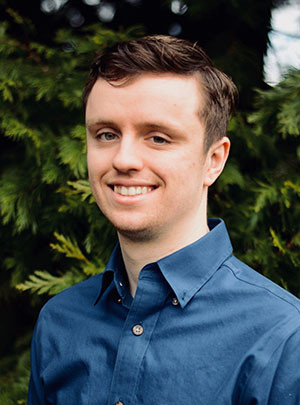 |
| Adam Smiley |
The National Science Foundation's Graduate Research Fellowship Program (GRFP) is highly competitive and provides fellowship support for graduate students (master or doctoral) in science, technology, engineering, and mathematics. Recipients are given a three-year award consisting of a fellowship stipend and an education allowance, in addition to the powerful networking opportunities and resources afforded by being selected as a fellow.
The Department of Psychology is fortunate to have several NSF fellows in our graduate program. Adam Smiley, a second year student in the Social Psychology & Personality Area with Dr. Cheryl Kaiser, is our most recent recipient of this prestigious fellowship.
Let's start with the basics, where are you from and where did you complete undergrad/masters?
I grew up in Bellingham, WA, about 90 miles north of Seattle. I earned my BA in Psychology with a minor in Biblical Studies from Biola University in Southern California.
How did you wind up at UW/why did you apply here? What do you think about living in Seattle?
I moved to Seattle in 2017 when my wife, Andrea, started grad school at UW in the Doctorate of Physical Therapy (DPT) program (she graduates in June!). When she began her program, I was working as a behavior technician and later a barista, and volunteered as a research assistant in Sapna Cheryan’s lab during my free time. I got to meet a lot of the graduate students and faculty during my time as an RA, and I soon knew that UW was the place for me. I began as a PhD student in 2018, and I am very happy with my decision so far.
One of my favorite things about Seattle is all the opportunities for outdoor recreation. I love to run and bike on the Burke-Gilman trail, and swim in Lake Washington in the summer. It is also great to live close to my family, who live in Bellingham.
What is your research interest and how did you get into it (what inspires/motivates you)?
My main research interests involve looking at how political partisanship can function as a social identity. I’m interested in how Democrats and Republicans interact with each other, and I hope to learn how to reduce affective polarization (animosity and social distance between people of different political parties) and increase political cooperation.
I’m motivated to pursue this topic because even in my relatively short lifetime, I have already seen political discourse deteriorate, legislative cooperation take a backseat to partisan point-scoring, and friendships fall apart due to political disputes.
How did you learn about your funding opportunity and tell us about the application/waiting process?
My advisor, Cheryl Kaiser, encouraged me to apply for the NSF GRFP and assisted me throughout the process (as did many of my classmates and other faculty!). Waiting was hard, and I tried not to get my hopes up too much because I wasn’t sure if I would get it or not.
How did you feel when you learned that your application was accepted and that you will receive funding?
On March 30th (the day before my birthday) I checked my email and saw a bunch of emails from people in the department with “Congratulations” in the subject line. I was confused for a second, but then I scrolled down and saw the email from NSF, and I was so excited. It was just as fun telling my family, friends, and mentors the good news in the coming days! Not too shabby of a birthday present.
What is the name of your project and the funding source?
The name of my NSF-funded project is The Effect of Cross-Party Contact on Affective Polarization and Cooperation.
How might your research change the world?
It’s hard to say at this point if it will change the world or not! But I hope it will help people to move beyond political differences and treat each other as human beings who are worthy of dignity and respect.
Do you have any advice/tips/suggestions for others who may apply to this opportunity? About graduate study in general?
It worked out in the end, but I would have started on this grant MUCH earlier if I were to do it all over again. I think in the last 24 hours before the deadline I wrote three drafts of the proposal completely from scratch, trying to get it just right.
What do you like doing in your spare time?
During my free time I train for triathlon, play and watch soccer, attend UW football games, and read books about history. In the era of Covid-19 I’ve been really into online chess and hosting trivia contests for my friends on Instagram.
Supplemental Reading:
- Several graduate students have been featured in past issues for their NSF awards: Lily Durwood, Trent DesChamps, Linda Zou, Kelsey McCune, Arianne Eason, Laura Brady, Teri Kirby, and Bjorn Hubert-Wallander.
- More information on the GRFP can be found online.
- Assistance in applying to the NSF is provided by the UW Graduate School Fellowships and Assistantships Office.
- Grants and Funding Information Service (GFIS) through the UW Libraries.
Spring 2020 Updates from the Diversity Steering Committee
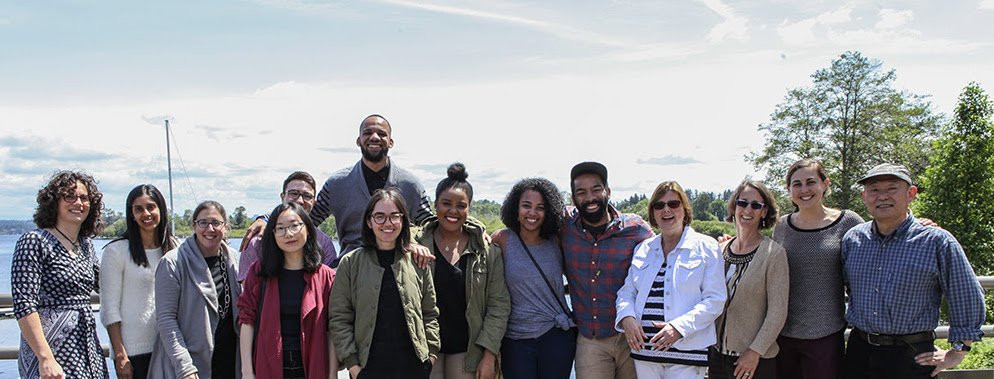 |
| Diversity Steering Committee |
This year the Diversity Steering Committee (DSC) pushed forward several new projects and initiatives. Here are some highlights.
URM Recruitment Programs Survey
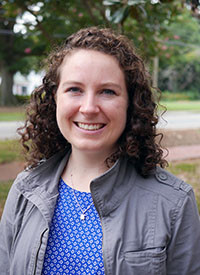 |
| Kim Bourne |
Kim Bourne (our DSC Research Assistant and Social Psychology & Personality Area with Cynthia Levine), has been working hard to collect data on URM recruitment programs from peer institutions. Our goal is to collect data on the effectiveness of these programs in increasing representation in psychology graduate programs so that we can implement a program of our own in the future.
Diversity and Inclusion Faculty Training
Professors Cheryl Kaiser and Lynn Fainsilber Katz have been working with the Center for Teaching and Learning to administer faculty diversity and inclusion trainings. Professor Kaiser requested the DSC create pre- and post-training assessments to evaluate the trainings. We have already administered the pre-training assessment and are working to finalize a post-training assessment and include relevant questions in the bi-annual climate survey, which will be administered next Autumn.
Syllabus Task Force
We have formed a task force to review faculty syllabi and have recently begun to push this initiative forward. We are still in the early phases, and we encourage anyone who might be interested or have suggestions to reach out to us and get involved!
Creating a Channel for Reporting Bias
In our commitment to creating inclusive spaces, DSC is beginning to identify potential channels for reporting bias within the department. We recognize the sensitivities of this topic and are working to ensure this channel is created (and subsequently maintained) with care. In the meantime, if you wish to (and feel comfortable) discussing a bias incident, the DSC’s doors are always open.
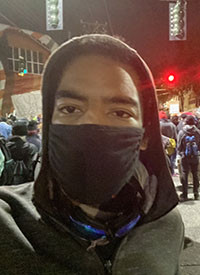 |
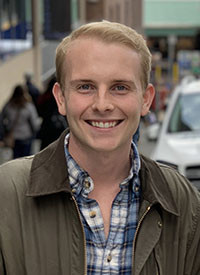 |
|
| Terrence Pope | Noah Triplett |
We also sadly report that Terrence Pope's (Social Psychology & Personality Area with Sapna Cheryan) time as a DSC co-chair is coming to an end this year. Terrence served for the past two years as a DSC co-chair. We continue to look forward to seeing what DSC can achieve under the continued leadership of Noah Triplett (Child Clinical Area with Shannon Dorsey) and our incoming graduate co-chair.
The DSC looks forward to supporting graduate students in exploring diversity science in their coursework, research, teaching, and other domains of engagement within and outside the UW. We are always welcoming greater participation from students and faculty. Please contact us at psychdsc@uw.edu or join us on Slack for more information or to ask how you can be a part of one of our upcoming projects!
Supplemental Reading:
Spring Research Festival & Awards
Our 49th Annual Psychology Research Festival took place online this year due to remote learning for Spring 2020. We had 17 students present their research in 15mins talks followed by 5 minutes of question-and-answer. Many members of the department and guests attended virtually which made the event feel special and community-supported. Following the research talks we presented awards which have been distributed during Spring and Summer 2020:
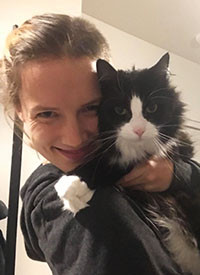 |
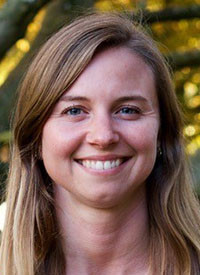 |
| Katherine Manbeck | Rosie Walker |
The Earl Hunt Graduate Fellowship Fund was created by our former faculty member, Earl “Buz” Hunt and his wife Marylou to support graduate students with their independent research. Katherine Manbeck (Adult Clinical Area with Jonathan Kanter) and Rosie Walker (Adult Clinical Area with Lori Zoellner) are the Summer 2020 Hunt Fellows.
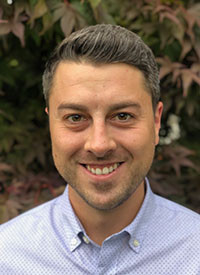 |
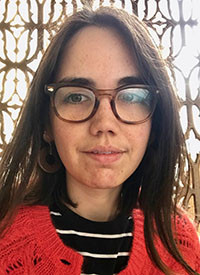 |
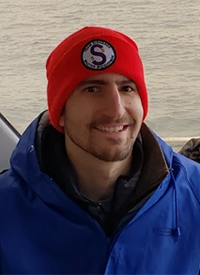 |
| Trent DesCamps | Adriana Germano | Nick Lozier |
The Alcor Scholarships are made possible by a bequest from Harry and Claire Garlick Peterson to the College of Arts & Sciences to support students in Psychology and Symphonic Music programs. Trent DesChamps (Child Clinical Area with Wendy Stone), Adriana Germano (Social Psychology & Personality with Sapna Cheryan), and Nick Lozier (Animal Behavior Area with Joseph Sisneros) are the 2020 Alcor Fellows in Summer quarter.
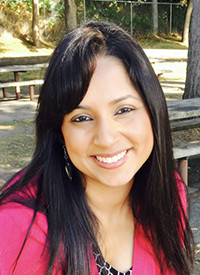 |
| Prerna Martin |
Emeritus Professor of Psychology Irwin Sarason established the Barbara Sarason Endowed Fellowship in honor of his late wife, Emeritus Research Professor Barbara Sarason who mentored many students in her prolific career. Irwin hopes that this fund will help to support students who are “on the way up” as Barbara would have wanted. Prerna Martin (Child Clinical Area with Shannon Dorsey) is the 2020 Spring Sarason Fellow.
The Pigott Diversity & Equity Fellowship honors graduate students with a demonstrated interest and active role in advancing diversity and equity in their science. We are proud to have students prioritizing these efforts through their research, outreach, departmental leadership and other activities. This year, Adriana Germano (Social Psychology & Personality with Sapna Cheryan) is the 2020 Spring Pigott Fellow.
Psychology Department Scholar Research Assistantships support students who will work on a project of their choosing over the summer. Saethra Darling (Animal Behavior Area with Mike Beecher), Thea Weiss (Developmental Area with Peter Kahn), Margarita Zeitlin (Cognition & Perception Area with Lee Osterhout), Ruiyu Zeng (Animal Behavior Area with Joseph Sisneros) are the 2020 Summer Psychology Department Scholars.
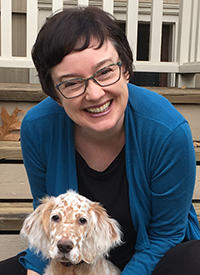 |
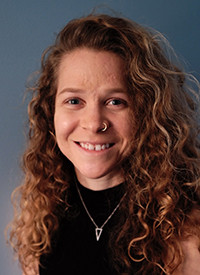 |
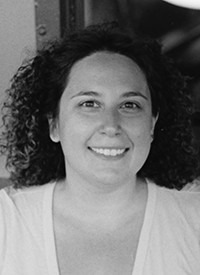 |
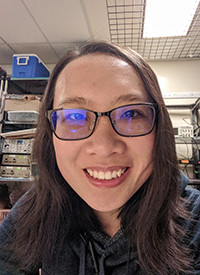 |
| Saethra Darling | Thea Weiss | Margarita Zeitlin | Ruiyu Zeng |
The Psychology Ph.D. Graduate Program identifies graduate students each spring who have contributed to the department and its members in lasting ways. This year we recognize Adriana Germano (Social Psychology & Personality with Sapna Cheryan), Terrence Pope (Social Psychology & Personality with Sapna Cheryan), and the Diversity Steering Committee for their leadership as co-chairs, creating initiatives and community-building events, and giving talks to Psychology Graduate Faculty regarding diversity climate. All their service and time have lead to a host of positive changes in the department and the future for graduate students.
 |
| Terrence Pope |
Graduate Program Action Committee Co-Chairs, Melissa Gasser (Adult Clinical with Bill George and Mary Larimer) and Jessica Glazier (Social Psychology & Personality Area with Kristina Olson & Cheryl Kaiser) in their roles as all-knowing of students and their contributions to the betterment of the graduate student experience, recognize Terrence Pope (Social Psychology & Personality with Sapna Cheryan) for the many hats he wears in all the committees in which he serves inside and outside of the Psychology Department, as the 2020 Graduate Student Service Award recipient.
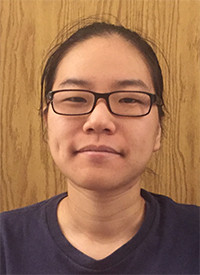 |
 |
 |
| Kelly Chang | Adriana Germano | Katherine Manbeck |
Scott Murray is Chair of the Distinguished Teaching Award for Graduate Students Committee and along with David Gire, Lauren Graham, Dana Nelson and Ariel Starr, they have decided on the 2020 Distinguished Teaching Award recipients from nominations received. Congratulations to Kelly Chang (Cognition & Perception Area with Geoff Boynton), Adriana Germano (Social Psychology & Personality with Sapna Cheryan), and Katherine Manbeck (Adult Clinical Area with Jonathan Kanter) for their overall career achievement and distinction in teaching!
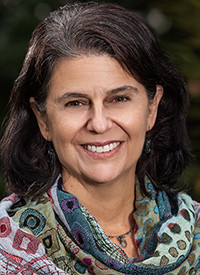 |
| Liliana Lengua |
This Davida Teller Distinguished Faculty Award in Psychology was created by Psychology Graduate students and named for emeritus faculty member, Davida Teller who was an outstanding mentor of graduate students and her role in revamping our entire graduate curriculum. This year, Lisa Shimomaeda (Child Clinical Area) and Mariah Corey (Child Clinical Area) co-presented their advisor, Liliana Lengua as the 2020 Distinguished Faculty Mentor, as voted on by their peers in the program.
We look forward to next year's 50th Annual Psychology Research Festival and hope to see you there (in-person) at the beautiful Waterfront Activities Center! Save the date for Wednesday, June 2, 2021.
Supplemental Reading:
Graduate Accomplishments
Coverage of Research and Awards
Dominic Sivitilli (Behavioral Neuroscience Area) and Professor David Gire's research on octopus intelligence continued to receive coverage in the The Daily and Seattle Met.
Professors Lori Zoellner and Michele Bedard-Gilligan along with graduate student, Emma PeConga (Adult Clinical Area), discuss anxiety, fear and active problem solving while dealing with an ambiguously threatening environment in the Seattle Times.
Rosemary Walker and Pete Rosencrans (Adult Clinical Area with Lori Zoellner) talk about mental health impacts of the coronavirus pandemic, and how to cope in an episode of This Podcast Will Kill You.
Congratulations to Adam Smiley (Social Psychology & Personality Area with Cheryl Kaiser) just received a NSF Graduate Research Fellowship! We have a research spotlight on our newest NSF recipient and his research in this newsletter.
Adam Kuczynski (Adult Clinial Area) with Professors Jonathan Kanter and Susan Joslyn, have received much attention for their various research on isolation, social distancing, fatigue, and human connection.
Megan Ramaiya (Adult Clinical Area with Jane Simoni) was awarded the Thomas Francis Jr. Global Health Fellowship for her work in Nepal. It is a $4,000 award that will support her travel and project expenses.
Prerna Martin (Child Clinical Area with Shannon Dorsey) was recently selected to receive the 2020-2021Graduate School Presidential Dissertation Fellowship. It is a one-quarter fellowship which provides stipend, tuition waivers, and graduate student health insurance from the Graduate School. Congratulations!
Master's Degrees Completed
Laina Keim (Child Clinical Area with Lynn Fainsilber Katz)
Doris Dai (Social Psychology & Personality Area with Stephanie Fryberg)
Candidate Status Achieved
Jessica Burgeno (Cognition & Perception Area with Susan Joslyn)
Kevan Kidder (Behavioral Neuroscience Area with Sheri J.Y. Mizumori)
Kevin Kuehn (Child Clinical Area with Kevin King)
Thea Weiss (Developmental Area with Peter Kahn)
Graduated with Doctoral Degrees
Eric Gomez (Social Psychology & Personality Area with Cheryl Kaiser)
Brian Jackson (Behavioral Neuroscience Area with David Gire)